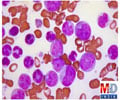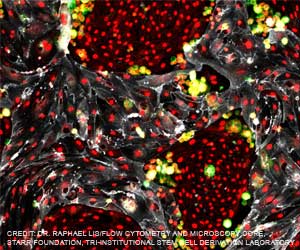Etanercept, an existing tumor necrosis factor-alpha blocker allows transplanted stem cells to thrive in new host.
- Etanercept increases the survival of transplanted blood stem cells in patients with life threatening blood cancers.
- Donor stem cells tend to have a self-destructive tendency to produce tumor necrosis factor-alpha (TNF-α), which may be overproduced, killing healthy cells.
- Etanercept is an antibody that works by binding to tumor necrosis factor-alpha and helping the donor cells to thrive in the host.
The Problem with Blood Stem Cell Transplants
Blood stem cells ae cells that can differentiate into all types of blood cells including white blood cells, red blood cells and platelets. However, most of the donor stem cells come from umbilical cord blood and the derived stem cells when transplanted do not get integrated into the recipient’s bone marrow to differentiate and produce a self-sustaining blood-forming system. Also, many umbilical cord blood donations are too small to provide enough mass of stem cells necessary to repopulate in a new host. Moreover, mismatched stem cell transplant can cause graft rejection and failure that is often fatal. New study has one reason for the lack of integration and differentiation of the transplanted cells. The study reports that once the donor stem cells are transplanted, some of them differentiate and have a tendency to express a self-destructive protein called the tumor necrosis factor-alpha (TNF-α). This is a protein that the immune system uses to fight infection. When TNF-α is overproduced by the newly differentiated transplanted cells, the immune system ends up attacking and killing these healthy cells.Study Overview
The study was led by Peter Zandstra, director of UBC’s new School of Biomedical Engineering and UBC’s Michael Smith Laboratories to test if existing TNF-α blockers could help transplanted stem cells to thrive in the new host.The study model used were mice with genetically weakened immune systems. Etanercept an antibody that binds and disables TNF-α, was administered to the mice. The drug is sold by Amgen in Canada and Enbrel in the U.S.
Two weeks later, it was observed that the mice treated with etanercept had a more diverse collection and a higher amount of blood stem cells in their bone marrow compared to the control group.
The study results provide strong evidence to conduct human clinical trials using etanercept or other TNF-α blockers to determine if it has the same transplanted stem cell saving property that was seen in mice.
Reference:
- W. Wang el al., "Enhanced human hematopoietic stem and progenitor cell engraftment by blocking donor T cell–mediated TNFα signaling," Science Translational Medicine (2017).
Source-Medindia
















